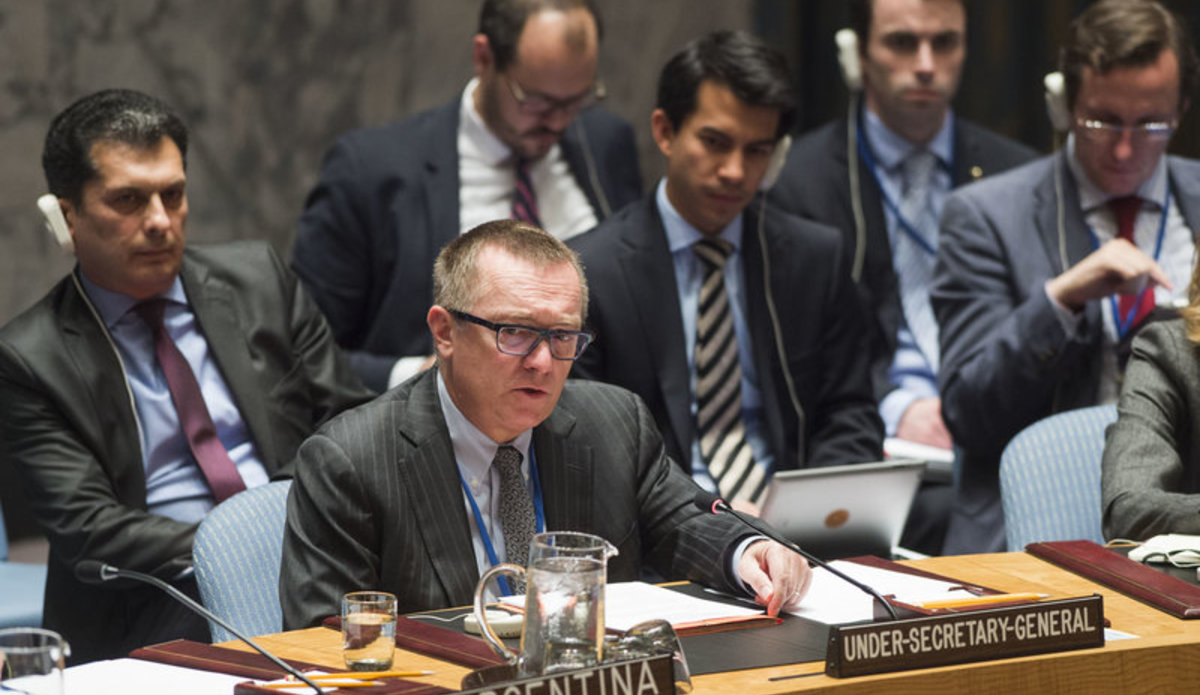Madam President,
I thank you for this opportunity to introduce the report of the Secretary-General on piracy and armed robbery off the coast of Somalia, which was submitted pursuant to Security Council resolution 2125 of 18 November 2013, and to brief the Security Council on this subject.
The Secretary-General welcomes the substantial gains made by Somalia and the international community in addressing piracy off the coast of Somalia. However he recognizes that without the continued deterrence support provided by the international naval presence, the self-protection measures adopted by the shipping industry and until such time as capacity-building efforts ashore have sufficient effect, large scale piracy may potentially return.
Since the adoption of the first Security Council resolution on piracy off the coast of Somalia in June 2008, some of our most urgent responses have revolved around the twin axis of deterring pirate attacks and prosecuting and sanctioning of pirates. Thanks to coordinated efforts by Member States, organizations and maritime industry, the incidents of piracy reported off the coast of Somalia are at their lowest levels in recent years. Indeed, the last time a large commercial vessel was hijacked, was more than two years ago.
But this progress is fragile and reversible. We still see pirates attempting to attack vessels and capture them for ransom. We still have to do more to ensure that commercial vessels can navigate the waters off the coast of Somalia without incidents and that the international community can benefit from the uninterrupted global trade in the 21st century.
The decline in pirate attacks provides an opportunity to review current international efforts and to take a long-term perspective on how best to contain Somali piracy. We should not only ask what more needs to be done to ensure that the scourge does not return, but also what kind of support could be provided to Somalia so that the country is able to respond to the threat of piracy without depending on the continuous support of international navies. We should address the underlying conditions conducive to the continuation of piracy, including political instability and the lack of alternative livelihoods.
Madam President,
Piracy off the coast of Somalia is also one of the manifestations of a political problem requiring a political solution. State collapse in Somalia and other political challenges lie at the root of the problem. This was as much acknowledged by the Security Council in relevant resolutions, including the most recent resolution 2125 (2013), in which the Council recognized that the on-going instability in Somalia is one of the underlying causes of the problem of piracy.
Security efforts can momentarily mitigate the impact of piracy but they do not address the underlying causes. A sustainable response to piracy requires the presence of effective governance in Somalia that will provide basic services to its people and guarantee their rights. This is a daunting, but unavoidable task, for it will enable Somalia to effectively address, and ultimately defeat, piracy.
This leads to the second point that I wish to emphasize. State-building and inclusive governance efforts in Somalia must be led and owned by Somalis themselves. While counter-piracy measures continue to prove effective, the international community must continue to support the Somali Government in its efforts to deliver on its commitments outlined in Vision 2016 and the Somali Compact. This will require concentrated and coordinated assistance to Somalia to build its institutional capacity to undertake effective law enforcement and promote inclusive and sustainable development.
As the United Nations helps strengthen the capacity of Somalia and other States in the region to prosecute individuals suspected of piracy and to sanction those convicted, in accordance with international standards, it is imperative that more nations criminalise piracy on the basis of international law as reflected in the United Nations Convention on the Law of the Sea. They must also take steps to deter and suppress the financing of piracy and the laundering of ransom money.
We should not forget that actions by any one State to apprehend and prosecute pirates will benefit all States whose vessels, trade and seafarers are at risk. If the burden of prosecuting pirates is shouldered only by States that apprehend them, then countries may be reluctant to act, especially if pirates do not target the apprehending country’s vessels.
In this regard, we welcome the increased willingness of many of Somalia’s neighbours to prosecute individuals suspected of piracy. It is equally critical that the international community continues to support Somalia and its neighbours in their efforts of sharing the burden of piracy prosecutions.
We strongly encourage the international community to support regional efforts to implement the 2050 Africa’s Integrated Maritime Strategy (2050 AIM Strategy), adopted by the African Union, the Djibouti Code of Conduct, the maritime initiatives of the Intergovernmental Authority for Development, and the Maritime Security Strategy of the Southern African Development Community, so that countries in the region (bordering the Gulf of Aden and western Indian Ocean) develop their capacity to address piracy and develop their maritime domain.
Somali pirates are still holding 37 seafarers, which is a matter of serious international concern. It is crucial that all efforts are made to secure the safe and prompt release of all hostages. Of equal importance is the need to have post-release measures in place to guarantee their health and well-being.
Our successful efforts to combat piracy off the coast of Somalia show that hard work and effective collaboration with a solution-oriented approach can yield results. Let me conclude by reiterating that counter-piracy efforts should be an integral part of Somalia’s state-building process. The international community should continue to address piracy across broader fronts, addressing institutional failures, and building capacity.
Thank you.

